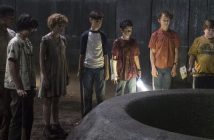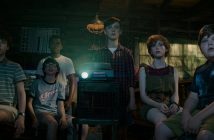 Editor’s Note: Home Again opens in wide theatrical release today, September 8, 2017.
Editor’s Note: Home Again opens in wide theatrical release today, September 8, 2017.
What a difference a decade (actually 12 years) makes: In 2005, Reese Witherspoon rode critical acclaim and academy love to an Oscar for Best Actress for her star turn opposite Joaquin Phoenix in Walk the Line. An Oscar, even one for Best Actor or Best Actress, however, doesn’t guarantee a steady stream of Oscar-worthy roles in prestige films year after year, decade after decade. More often than not, the opposite holds true or rather winning an Oscar seems to have a temporary effect at best. For Witherspoon, a string of unremarkable, unmemorable roles followed, each one squandering her skill and talents as a performer, each one bringing her perilously closer to the age (40) when character parts, mostly as mothers, sisters, or best friends, become the norm, regardless of how much they still have to offer to a wide range of roles typically set aside for younger, presumably more attractive women (because youth = beauty and age = experience in and out of Hollywood).
In writer-director Hallie Meyers-Shyer’s feature-length debut, Home Again, Witherspoon essays a not-quite-struggling, soon-to-be-divorced mother of two, Alice Kinney. Alice has just hit the dreaded 4-0, an apparently stark reminder of the opportunities lost and the time she won’t regain. Newly separated and back in the City of Angels where she grew up as the child of divorced parents, he a well-respected, John Cassavetes-like indie filmmaker who’s long left this mortal coil behind, and a onetime actress mother. Luckily for Alice, there’s an empty home, her father’s, to make completely her own. Large, spacious, and equipped with a seemingly unused pool and a guesthouse, it’s the kind of home the vast majority of Americans can’t afford, especially in a socially, economically, and culturally stratified LA, and thus envy (a staple of Nancy “mother of Hallie” Shyer’s filmography).
But all the casual, unmotivated pans and shots of sunlight interiors only get you so far and that’s where Meyers-Shyer’s gets into a sizable jam. She has one of the best actresses of her generation at her disposal, but only a middling, logic- and reality-challenged script to offer said actress. Leaning heavily on her mother’s stock-in-script-trade, Meyers-Shyer’s screenplay hits practically every beat of the romantic-comedy genre, albeit with one or two superficial tweaks, primarily in a premise that throws an unsure-of-herself Alice with three young wannabe filmmakers, Harry (Pico Alexander), an aspiring director, George (Jon Rudnitsky), an ambitious screenwriter, and Teddy (Nat Wolff), a would-be actor. Alice “meets cute” with Harry at a bar and before she knows it, she wakes up to Harry in her bed and George and Teddy on her living room sofa. Once the trio meet and charm Alice’ mother, Lilian (Candice Bergen), their unorthodox living situation is all but a done deal.
Meyers-Shyer has more than a few issues in developing characters that resemble real human beings and even more problems when telling a story that doesn’t strain audience credulity to the breaking point and beyond. She relies heavily on moviegoers and their collective suspension of disbelief to buy into Alice’s new, sitcom-ready living situation, complete with romantic complications (Harry’s young, immature, and unlikely to remain long-term in a monogamous relationship), professional ones (Alice’s half-interested attempt to start an interior decorating business goes awry when her first client turns out to be monstrous), and personal ones (her two daughters, still adjusting to their parents unwanted separation), but none of those complications feel even remotely real, let alone believable, not to mention short on the comedy expected from a so-called romantic-comedy. There’s little sense of urgency, let alone fun, in all or most of the proceedings too.
Even when Alice’s wayward ex, Austin (Michael Sheen), drops in unexpectedly after he hears about Alice’s unconventional living arrangement, the sparks never fly, they just smolder until someone stomps them out with a well-placed stiletto heel or over-expensive fashion sneaker. Meyers-Shyer tries to add momentum to Harry, George, and Teddy’s half-hearted pursuit of a career-making film deal, but gives up more than halfway through. The “will they or won’t they” question hovering over their cinematic aspirations dissipates once Harry shoulder shrugs his way what should be the most important meeting of his career, all at once recognizing that the end of one deal doesn’t mean the end of all deals (insert yawn). Oddly, Myers-Shyer does something rare among few first-time filmmakers: She absolutely, positively nails the ending. She nails the voice-over heavy opening too. Ultimately, however, both feel like they belong in different, better films, one where rewarding moviegoing experiences extend beyond mildly engaging prologues and epilogues.
In Home Again, none of the usual rom-com complications feel even remotely real, let alone believable. There’s little sense of urgency, let alone fun, in all or most of the proceedings.



